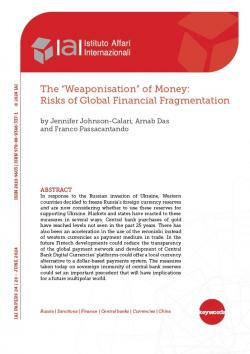The “Weaponisation” of Money: Risks of Global Financial Fragmentation
In response to the Russian invasion of Ukraine, Western countries decided to freeze Russia’s foreign currency reserves and are now considering whether to use these reserves for supporting Ukraine. Markets and states have reacted to these measures in several ways. Central bank purchases of gold have reached levels not seen in the past 25 years. There has also been an acceleration in the use of the renminbi instead of western currencies as payment medium in trade. In the future Fintech developments could reduce the transparency of the global payment network and development of Central Bank Digital Currencies’ platforms could offer a local currency alternative to a dollar-based payments system. The measures taken today on sovereign immunity of central bank reserves could set an important precedent that will have implications for a future multipolar world.
-
Details
Rome, IAI, June 2024, 16 p. -
In:
-
Issue
24|20 -
ISBN/ISSN/DOI:
978-88-9368-337-1
Introduction
1. The principle of central banks’ immunity
2. The continuous dominance of the US dollar as a reserve currency
3. Gold and “tokens” as international reserves
4. The internationalisation of the renminbi
4.1 The renminbi’s growing role in cross-border payments
4.2 The development of alternative financial market infrastructures
Conclusion
References
Topic
Tag
Related content
-
Event26/03/2024
Financial sanctions and the future of the international monetary system
leggi tutto -
Ricerca28/11/2020
IAI-Intesa Sanpaolo Strategic Partnership
leggi tutto



